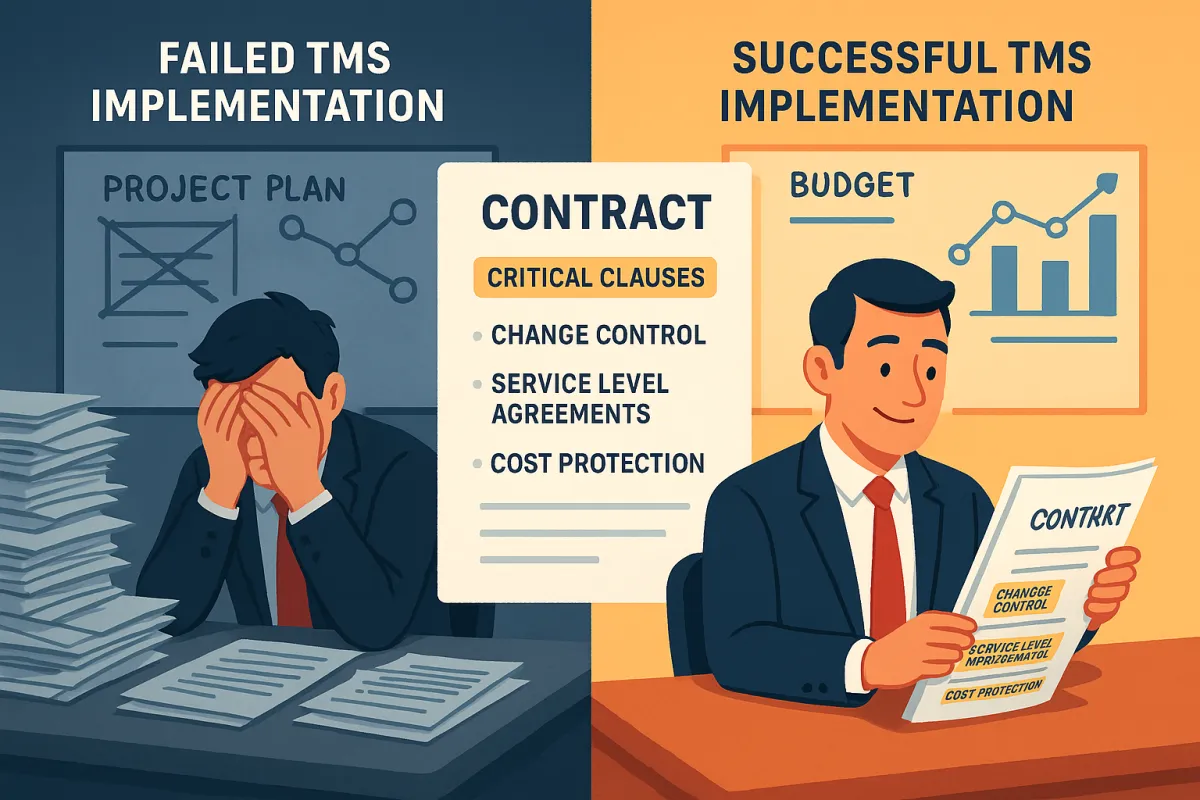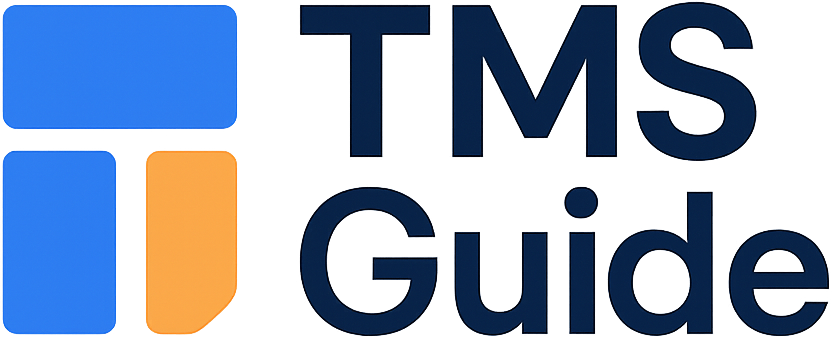TMS Contracts That Don't Fail: 8 Critical Clauses to Prevent Budget Overruns and Implementation Disasters

Your TMS procurement team thinks they've done everything right. Request for proposals sent to five vendors, scoring matrices completed, due diligence calls scheduled. But 66% of enterprise software projects have cost overruns, with $66 billion in total overruns according to McKinsey's research with Oxford University. Half of all large IT projects exceed their budgets by 45% while delivering 56% less value than promised.
The problem isn't just scope creep or vendor overselling. Changing project requirements can increase project costs by up to 50%, but the real damage comes from contracts that fail to protect buyers when projects inevitably veer off course. Your TMS contract needs to anticipate these failures and structure protections that actually work.
The New Regulatory Landscape: EU Data Act Changes the Game
The Data Act will become applicable on 12 September 2025, fundamentally shifting the balance of power in TMS vendor contracts. The European Commission's Expert Group published model contractual terms and standard contractual clauses designed to help companies comply with the Data Act and establish fair, secure, and transparent agreements for data sharing and cloud services.
For TMS buyers, this creates new negotiating leverage. Cloud-native providers like Cargoson, nShift, and E2open must now comply with stricter requirements for data portability and switching provisions. Cloud service providers must simplify the process for users to switch providers and remove or reduce contractual lock-in clauses, make pricing for data transfer more transparent.
You can now demand specific switching mechanisms, transparent export pricing, and clearer data ownership terms. The old "take it or leave it" approach from dominant TMS vendors becomes legally problematic under the new framework.
Implementation Scope and Change Control
Most TMS implementations start with a defined scope that grows like a weed. A shipper planning to connect 50 carriers ends up integrating 120. Cross-border documentation requirements that weren't mentioned in the original SOW suddenly become "essential" features costing an additional €75,000.
Your contract needs to define implementation boundaries with surgical precision. Specify exactly which integrations are included, which carrier APIs are covered, and what constitutes "standard" functionality versus customization. Include a formal change control process that requires written approval for any scope additions, complete with cost impact assessments and timeline adjustments.
When Descartes quotes a fixed price for implementation, that number should cover everything in scope. When Manhattan Active proposes their "rapid deployment" methodology, the contract should specify exactly what rapid means and what happens if they miss those timelines. Build in protection against the classic vendor move of claiming that your requirements are "non-standard" and therefore require additional fees.
Performance Guarantees and Service Level Agreements
Generic uptime guarantees miss the point. Your TMS needs to deliver functional performance, not just technical availability. Structure SLAs around adoption metrics rather than server statistics.
Demand guarantees around user adoption rates. If fewer than 80% of your freight planners are actively using the system within the first year, something has gone wrong with either the implementation or the software itself. Include automation benchmarks: 50-70% of routine shipments should process with minimal manual intervention.
Visibility requirements matter more than uptime. Your contract should guarantee sub-hour reporting latency on critical shipment milestones. When a shipment crosses a border or hits a delay, you need to know immediately, not during the next batch processing cycle. Oracle TM and Blue Yonder typically offer these guarantees, but you need to specifically ask for them in your contract.
Build penalty structures that hurt. If the vendor misses adoption targets, they should provide additional training at no cost. If automation rates fall short, they should assign dedicated resources to optimize workflow configurations. Make the vendor's success directly tied to your operational success.
Cost Protection and Budget Controls
Every additional year spent on a project increases cost overruns by 15%. Longer implementations don't just cost more time, they cost exponentially more money. Your contract needs caps on both timelines and costs.
Separate fixed-price components from variable elements. License fees, core implementation services, and standard integrations should be fixed. Carrier connection fees, API usage charges, and custom reporting can remain variable, but with clearly defined pricing structures and volume discounts.
Include total cost of ownership protection beyond the software itself. Many TMS implementations require additional EDI connections, upgraded WMS integrations, or enhanced carrier partnerships. Your vendor should provide cost estimates for these elements and commit to not exceeding them by more than 10% without written approval.
Build in budget reconciliation procedures. Every quarter, review actual spend against projected costs. If the vendor is tracking toward a significant overrun, they need to present options for staying within budget, even if it means reducing scope or extending timelines.
Data Security and Compliance Under New EU Rules
The September 2025 Data Act changes everything about data security clauses. Existing contracts must be reviewed for compliance with the Data Act and adjusted if necessary. Your TMS vendor can no longer hide behind vague security promises or proprietary data handling practices.
Include specific GDPR compliance requirements with regular audit rights. 45% of procurement teams cite data security as their top concern, but most contracts don't give buyers meaningful control over security practices. Demand quarterly security reports, annual penetration testing results, and immediate notification of any security incidents.
Data residency becomes non-negotiable for European shippers. Your shipment data, customer information, and operational metrics must remain within EU boundaries unless you explicitly authorize otherwise. Platforms like Alpega and Transporeon typically offer EU-hosted options, while US-based providers like Manhattan or Oracle may require specific contractual language to ensure compliance.
Include clear data ownership and portability requirements. Under the new regulatory framework, switching between TMS providers becomes easier, but only if your contract includes proper data export provisions. Specify exactly how your data will be formatted for export and what assistance the vendor will provide during migration.
Termination and Exit Rights
Vendor lock-in remains the biggest long-term risk in TMS contracts. You might love your current system, but mergers, acquisitions, or strategic pivots can change everything overnight. Your contract needs to assume that you'll eventually want to switch.
Include comprehensive data export requirements. Your vendor should provide all historical data in standard formats (CSV, XML, EDI) within 30 days of termination notice. This includes shipment history, carrier agreements, rate tables, and custom configuration settings. The export should be complete enough that a new TMS can replicate your current operational setup.
Demand transition assistance as part of the standard contract. The vendor should provide technical support during migration, including API documentation, database schemas, and integration specifications. Cloud platforms like Cargoson and E2open typically offer more flexibility here than legacy providers, but you need to contractually guarantee this support.
Structure termination clauses with teeth. If you terminate for cause due to vendor performance failures, you should receive a full refund of implementation costs plus assistance finding a replacement system. This gives vendors real incentive to deliver on their promises rather than treating your project as a revenue opportunity.
Implementation Governance Framework
Complex TMS implementations typically run 8-12 weeks manually coordinated. Well-governed projects with proper oversight can reduce this to 4-6 week cycle times through disciplined project management and clear accountability structures.
Establish clear target architecture before implementation begins. Your vendor should document exactly how the system will integrate with your existing WMS, ERP, and carrier systems. Include intermediate value plateaus, so you can start using basic functionality while more advanced features come online.
Create stakeholder alignment protocols. Finance needs to understand how the new system affects invoice processing. Operations needs clear training schedules. IT requires technical specifications and security documentation. Your contract should specify exactly what documentation and training the vendor will provide to each stakeholder group.
Build in governance escalation procedures. When issues arise, and they will, you need clear paths for resolution. Include executive sponsor involvement from both sides, with specific timelines for issue resolution. If the vendor can't solve a technical problem within five business days, senior engineering resources should be assigned.
Negotiation Tactics in Today's Market
European transport faces a driver shortage of 426,000 positions, creating capacity constraints that affect TMS procurement timing. When freight capacity is tight, shippers have more negotiating leverage with TMS providers who want to capture market share during growth periods.
Use competitive dynamics strategically. Oracle TM and Blue Yonder compete directly in the enterprise market. Manhattan Active and Descartes target similar shipper profiles. Position these vendors against each other on specific technical requirements rather than just price.
Time your negotiations around vendor sales cycles. Fourth-quarter deals typically offer better pricing as vendors push to meet annual targets. But avoid year-end implementations unless you're prepared for reduced support during holiday periods.
Leverage reference customers effectively. Don't just ask for client references, ask for specific implementations similar to yours. A successful automotive manufacturer implementation doesn't predict success with fashion retail logistics. Cargoson's strength in European cross-border shipments may not translate to domestic distribution requirements.
The goal isn't just a signed contract. You need an agreement that protects your investment, ensures successful implementation, and provides long-term operational value. These eight contract clauses give you the foundation to achieve that outcome, but the real work happens in negotiation and execution. Start with these protections and adapt them to your specific operational requirements and risk tolerance.





